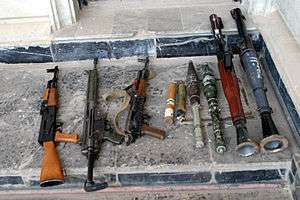Small arms

In international arms control, small arms include revolvers and pistols, rifles and carbines, assault rifles, submachine guns and light machine guns. Together with light weapons (heavy machine guns; hand-held grenade launchers; portable anti-aircraft and anti-tank guns; recoilless rifles; portable launchers of anti-aircraft and anti-tank missile systems; and mortars of calibres of less than 100 mm), they comprise the Small Arms and Light Weapons (SALW) protocol.[1][2]
According to the United Nations: "Since weapons in this class are capable of being carried, if a small arm, by one person or, if a light arm, by two or more people, a pack animal or a light vehicle, they allow for mobile operations where heavy mechanized and air forces are not available or are restricted in their capabilities owing to difficult mountain, jungle or urban terrain."
In the U.S. military, small arms are "man portable, individual, and crew-served weapon systems used mainly against personnel and lightly armored or unarmored equipment".[3] However, in regard to inventory management, the U.S. Army says small arms/light weapons (SA/LW) are: "Handguns, shoulder-fired weapons, light automatic weapons up to and including 12.7mm machine guns, recoilless rifles up to and including 106mm, mortars up to and including 81mm, man-portable rocket launchers, rifle-/shoulder-fired grenade launchers, and individually operated weapons that are portable or can be fired without special mounts or firing devices and that have potential use in civil disturbances and are vulnerable to theft.
The world's top small arms producing companies are Browning Arms, Remington Arms, Colt Arms, Sturm, Ruger & Co (US), Heckler & Koch, SIG Sauer, Walther (Germany), FN Herstal (Belgium), Beretta (Italy), Tula Arms and Kalashnikov (Russia) while former top producers were Mauser & Springfield Armory.
Much of the international work to address the illegal arms trade (or arms trafficking) is raised in the United Nations Conference on the Illicit Trade in Small Arms.[4]
Global distribution of small arms
In 2013, the Small Arms Survey said that of the 875 million small arms distributed globally, 650 million — almost 75 percent — are in civilian hands.[5] (U.S. civilians account for 270 million of this total.)[lower-alpha 1][6]:39 About 200 million are controlled by armed forces and about 26 million by law enforcement agencies.[7]:102 Gang members hold between 2 and 10 million small arms and armed, non-state actors[lower-alpha 2] hold about 1.4 million.[7]:101 Together, the small-arms arsenals of non-state actors and gangs account for 0.4 to 1.3 percent of the global total.[7]:101
See also
Explanatory notes
References
- ↑ "General and Complete Disarmament: Small Arms". www.un.org. United Nations. August 27, 1997. Retrieved February 10, 2014.
- ↑ "Small Arms Survey: Definitions". smallarmssurvey.org. Small Arms Survey. April 15, 2013. Retrieved February 10, 2014.
- ↑ "DOD Dictionary of Military and Associated Terms: Small arms". www.dtic.mil. U.S. Department of Defense. September 14, 2012. Retrieved February 13, 2014.
- ↑ "UN Small Arms and Light Weapons (SALW) Conference". www.globalpolicy.org. Global Policy Forum. Retrieved February 10, 2014.
- ↑ "Small Arms Survey: Civilian Inventories". www.smallarmssurvey.org. Small Arms Survey. February 11, 2013. Retrieved February 13, 2014.
- ↑ Karp, Aaron (2007). "Completing the Count: Civilian Firearms" (PDF). Small Arms Survey 2007: Guns and the City. Cambridge University Press. ISBN 9780521706544.
- 1 2 3 Karp, Aaron (2010). "Elusive Arsenals: Gang and Group Firearms" (PDF). Small Arms Survey 2010: Gangs, Groups, and Guns. Cambridge University Press. ISBN 9780521146845.
Further reading
- Dikshif, P. Proliferation of Small Arms and Minor Weapons, Strategic Analysis, Vol. 17(2) May 1994.
- Gould, C. and Lamb, G., Hide & Seek: Taking Account of Small Arms in Southern Africa, Institute for Security Studies, Pretoria, 2004.
External links
- Federation of American Scientists (FAS) Small Arms Monitoring page
- Small Arms Survey
- "How Small Arms Work - Training Film" on YouTube